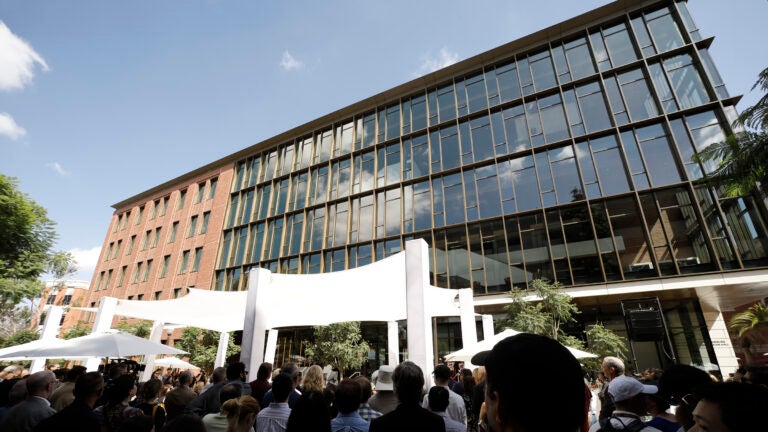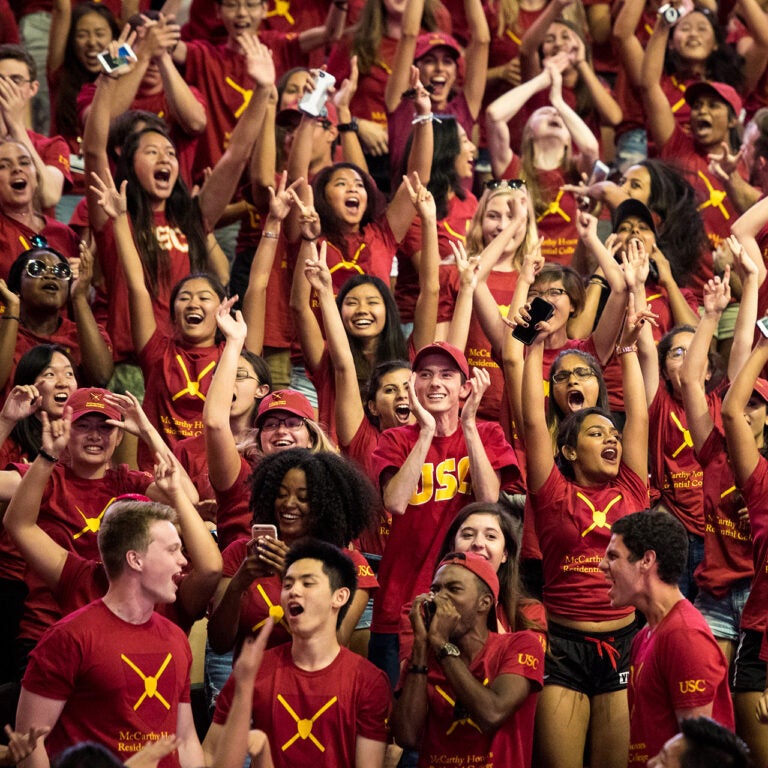The ribbon-cutting ceremony for the new Dr. Allen and Charlotte Ginsburg Human-Centered Computation Hall was held Tuesday. (USC Photo/Steve Cohn)
Science/Technology
USC computer science and technology programs build fundraising momentum
Donors bring the university halfway to its $1 billion Frontiers of Computing goal.
As USC looks to a future built around the power and potential of advanced computing, the university’s friends and donors are endorsing that vision. They’ve pushed USC to a historic milestone, reaching halfway to the $1 billion fundraising goal for USC President Carol Folt’s Frontiers of Computing “moonshot.”
Within the past month, the new Dr. Allen and Charlotte Ginsburg Human-Centered Computation Hall opened, and USC has also announced numerous gifts supporting Frontiers of Computing, a 10-year drive to bring advanced computing’s benefits to the world.
“Our Frontiers of Computing moonshot will make USC the leader in advanced computing,” Folt said. “That will take human innovation, with ethics at the core.”
Gifts from Allen and Charlotte Ginsburg and 38 other donors helped USC build Ginsburg Hall, which houses the new USC School of Advanced Computing. This eco-friendly, 116,000-square-foot structure opened Sept. 17 and is USC’s first LEED Platinum-certified building. The School of Advanced Computing, a unit within the USC Viterbi School of Engineering, unites computer scientists and engineers with experts in health, sustainability, cybersecurity and the social sciences.
From biomedical research to computing
Allen Ginsburg, a retired ophthalmologist, and his wife, Charlotte, a philanthropist, have supported USC before. In 2018, their gift named the USC Dr. Allen and Charlotte Ginsburg Institute for Biomedical Therapeutics. Now they’re enthusiastic about supporting another hotbed of discovery — one they hope will advance humanity as much as it does technology.
“We firmly believe that science and education are vital to improving the human condition, and technology must serve humanity,” Allen Ginsburg said. “It brings us joy to know that students in this building will develop their curiosity and harness technology to solve the planet’s most difficult problems.”
For his part, USC Life Trustee Andrew Viterbi is helping to ensure that this new building will be home to world-class faculty.
Viterbi is well-known for his immense contributions to the field of digital technology as an educator, inventor, researcher and co-founder of Qualcomm Inc. Those experiences inspired him and his late wife, Erna, to give the naming gift to USC Viterbi 20 years ago — the largest naming gift to an engineering school in history at that time.
Now, Viterbi has invested in the recruitment of faculty with a $10 million gift for the School of Advanced Computing. The university matched Viterbi’s gift with $5 million, creating a $15 million endowment to support new professors who will integrate advanced computing with other academic disciplines.
“This gift is in support of people,” said Viterbi, who earned his doctorate in 1962 from USC, taught and performed research for 31 years as professor of electrical and computer engineering at two University of California campuses and created the Viterbi algorithm that protects voice and data transmissions in billions of mobile phones. “Faculty with distinguished reputations enhance the university’s teaching and research, and they attract the best students to follow in their footsteps, training successors to advance our nation’s leadership in science and technology.”
Avenues to support students
The Frontiers of Computing moonshot also creates avenues for philanthropists to directly support students. The new High-Tech Scholars program provides mentoring, financial assistance, career experience and internships to promising computing and technology students who transfer to USC from California community colleges.
When USC Trustee Kathy Leventhal and her husband, Richard, heard Folt describe her vision for High-Tech Scholars, they knew they wanted to strengthen the program with a significant gift. The Leventhals’ $4 million gift moves USC closer to its goal of giving financial support to 60 juniors and seniors each year.
USC Trustee Oscar Munoz and his wife, Cathy, made a significant gift to High-Tech Scholars to pay it forward and support motivated students from underserved communities. Oscar Munoz emigrated from Mexico and was the first in a family of nine to go to college, graduating from the USC Marshall School of Business and eventually becoming the CEO of United Airlines.
Frontiers of Computing stretches back to 2019, when a $260 million gift to USC from the Lord Foundation of California kickstarted the effort. Folt reimagined that gift to advance and expand computing research and education across the university in a strategic and thoughtful way.
“I want every student who comes through our programs, whether they are in science, business, the humanities or the arts, to have a solid grounding in technology and the ethics of the work that they do,” Folt said. “We will integrate digital literacy across disciplines to create responsible leaders for the workforce of the future.”

